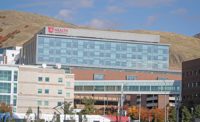Flexibility Spurs Fast-Track Health Care project






A little more than 10 years ago, Phoenix lost out to neighboring Glendale as the site for a football-only stadium for the NFL’s Arizona Cardinals. Shortly after that, the idea of putting a biomedical campus in downtown Phoenix was born.
Phoenix partnered primarily with the University of Arizona, along with several private and nonprofit medical groups, to develop the Phoenix Biomedical Campus, or PBC.
By late 2012, four projects and 640,000 sq ft of the campus had been built, including the Translational Genomics Institute, the University of Arizona Medical School and the 268,000-sq-ft Health Sciences Education Building.
Next up for Phoenix and the University of Arizona at the PBC is a National Cancer Institute-accredited cancer center that will be operated by Dignity Health. The Arizona Board of Regents approved a resolution that removed the final hurdle in a multi-organization development agreement in December 2012, and less than 18 months later, the building was topped out. The design-build delivery method was the only way to meet the fast-track time line, according to Blake Christian, a project manager with Hensel Phelps Construction Co., the contractor.
“Every job has a sweet spot of what the delivery method would be, but without using design-build, we never would have met the requirements,” he says.
The fast-track schedule was not the only challenge, however. In addition, the construction team, which also included ZGF Architects, faced major adjustments to the chiller designs and had to eliminate more than $25 million and two floors from the initial facility plan.
The result is a high-tech and closely collaborative project that has pushed the boundaries of design-build delivery.
Timeline And Other Pressures
After gaining the regents’ approval, the first deadline came at the end of 2012: securing a multimillion dollar payment from the city of Phoenix. According to Gary Bagnoche, director of the University of Arizona’s Planning Design and Construction and the Phoenix Biomedical Campus, the first dirt was moved between Christmas and New Year’s to meet the terms of the development deal.
Jeremy Legg, economic development manager with the city of Phoenix, says such deadlines help deals get made and protect the city’s considerable investments.






